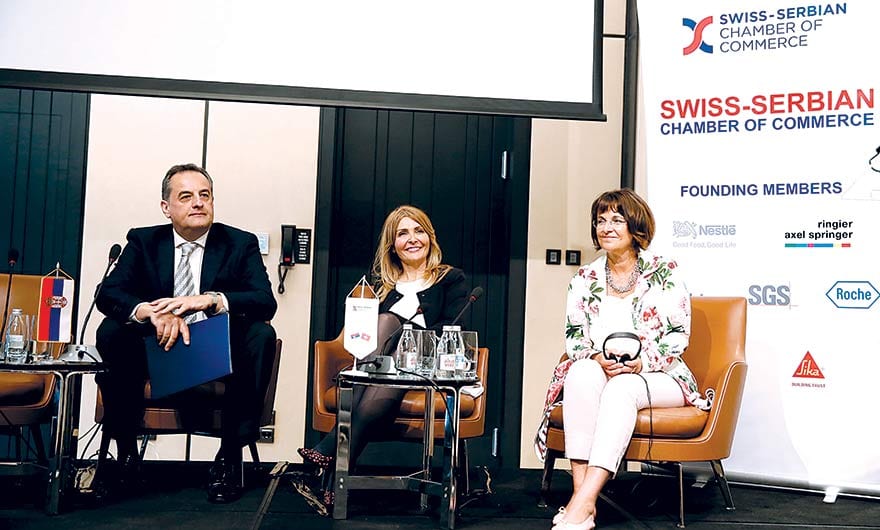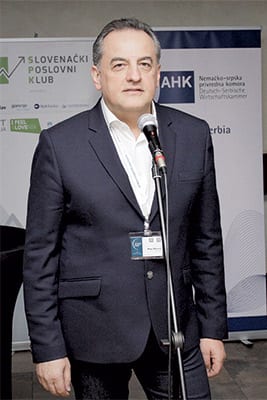Although Switzerland is an important donor to Serbia in economic terms, it seems that those investments have yet to yield results when it comes to the two countries’ mutual trade exchange. With its activities, the SSCC strives to bring together business people from the two countries and enable them to utilize the evident potential for cooperation
The ICT sector and agro-tech, or digital agriculture, represent sectors with exceptional potential when it comes to establishing business bonds between Swiss and Serbian companies, says Swiss-Serbian Chamber of Commerce President Majo Mićović, who also runs a successful IT company.
In this interview with SSCC President Mićović, we discussed the Chamber’s role in bilateral economic relations between Serbia and Switzerland and new areas for cooperation and development in a, currently, fairly modest bilateral trade exchanges between the two countries.
“Despite being a young chamber, the SSCC is – with the active work of both the management board and members – gaining more and more credibility among the business audience in both Serbia and Switzerland. Annual conferences are attended to the maximum and resound greatly among the business and political communities.
Cooperation – both with the Embassy and its development bodies, and with Swiss development support organisations – is clearly strengthening,” says Mićović, whilst noting that Switzerland Global Enterprise (S-GE) has confirmed that its cooperation with the SSCC is in the top three among all Swiss bilateral chambers worldwide.
“The reports of our Chamber are among the most read on the S-GE website. Last year’s Conference of the Chamber on dual education was among the most attractive reviews of the dual education system in Serbia for the media. Although the trend of political cooperation between the two countries isn’t currently at the level of their possibilities, primarily thanks to the Kosovo issue, the Chamber is striving to ensure its activities continue to bring the businesspeople of the two countries closer together,” adds the SSCC president.
What do results to date tell you about the existing potential for the further development of economic relations between Switzerland and Serbia?
– It is obvious that the total bilateral exchange of 450 million euros is far from the capacities and needs of the two countries. There are many reasons why economic relations are insufficiently developed: mutual unfamiliarity and a lack of market connections, major differences in the level of economic development of the two countries, the long-standing political instability of the Balkan region, the two countries’ social and cultural orientation towards different geopolitical spheres and so on. Unfortunately, although Switzerland is an important donor in an economic sense, those investments don’t seem to impact on strengthening the exchange of goods between the two countries to a great extent.

Countries like Germany, Italy, China and Russia obviously more easily find business interests for their companies than Switzerland does. When it comes to attempts by Serbian companies to find a place for themselves on the Swiss market, we can only say that they are sporadic, and I sincerely admire our people from Serbia who invest their capacities to prove themselves on the Swiss market. It is interesting that Serbia’s direct investments in Switzerland in 2018 were just below 100 million euros, which ranks these investments in third place, behind Serbia’s investments in Slovenia and Bosnia.
ICT is among the sectors in Serbia that are increasingly attracting the attention of foreign investors. How much room exists in this area for cooperation between Swiss and Serbian companies?
– Thanks to the appropriate policy of the Serbian Government, the general trend towards digital transformation, and the natural talents of Serbian students in the fields of mathematics, technology and digital trends generally, Serbia has established itself in Europe and around the world as a desirable ICT outsource destination. This process has also led to the exceptional success of Serbia’s IT industry, which last year passed the magical boundary of 1 billion dollars in exports.
Serbian ICT companies have clearly recognised the trends and succeed in overcoming the classic outsource concept, which is still just a basic concept of cooperation with foreign capital. Our ICT companies achieve successful cooperation with world vendors in the field of the distribution and implementation of the most complex ICT solutions. Likewise, there are ever more innovative approaches to the development of ICT solutions, particularly in the areas of digital agriculture, healthcare and digital entertainment.
According to the assessment of Switzerland Global Enterprise, its cooperation with the SSCC is in the top three among all Swiss bilateral chambers worldwide
I’m familiar with the fact that Swiss ICT companies are increasingly approaching the Serbian ICT milieu, recognising what’s already been done by major global businesses, like Microsoft, NCR and many others. That said, we must stress that Serbian ICT capacities, in terms of skilled labour, have already been largely utilised with the arrival of world leaders in ICT. Areas with more capacity still, I believe those are primarily ICT security, which is one of the most prominent ICT trends worldwide, then the development of business applications, digital entertainment, such as the gaming industry, and agro-tech applications. As an example, company Sky Express d.o.o, which was established by Swiss capital, proves that cooperation with Switzerland is certainly possible: for nine years already, Sky Express and Zurich-based OPEN Systems – an MSSP world leader – have been cooperating in providing the secure internet communications for Serbia’s most important state bodies.
Is this also the right sector for networking the highly professional Serbian diaspora in Switzerland with companies in Serbia?
– Of the approximately five million Serbs living and working worldwide, over 200,000 of them are resident in Switzerland. It is known that the Serbian diaspora in Switzerland is among the country’s largest and most influential immigrant communities.

They send home to their families around 400 million euros a year, of a total of 3.2 billion euros that arrives in Serbia in this way every year. So, less than five per cent of the world’s Serbian diaspora sends more than 12 per cent of total remittances to Serbia, which testifies sufficiently to the structure of the Serbian diaspora in Switzerland.
Unfortunately, the importance that our countrymen have in Switzerland is not adequately exploited in relations between the two countries.
Improvements are possible on two fronts: one is the extraordinary financial potential of our people in Switzerland, which is insufficiently conducted in terms of direct investments in the Serbian economy, and secondly, there is the potential in professional capacities of our experts, who have been considered in Switzerland for years as excellent and acknowledged personnel, whether in the field of science, in medical and tourism services, in ICT and classical industries. With the exception of the ICT sector, as your question suggests, I see another sector with extraordinary potential and that’s agro-tech, i.e. digital agriculture.
How relevant is the issue of the availability of high-quality workers among your members? Has the transferring to Serbia of Swiss experiences in dual education yielded results as yet?
– Dual education is still in its commencement, and it would be hard to see some significant immediate results in terms of increasing the capacity of a skilled workforce. I’m convinced that such results will soon actually be visible, as I consider dual education to be a significant corrective aspect of the classical Serbian education policy. Generally, the trend of acquiring skilled workforce is also showing issues in Serbia: it is becoming increasingly difficult to find suitable personnel, especially in branches like ICT, medicine and the high-tech and hotel industries.
You have also used a survey to gauge the level of satisfaction among CCSS members in the Chamber and its work. What kind of feedback did you receive from members?
– The generally satisfactory trend continued in the last report, with a somewhat lower level compared to the previous year. Factors of satisfaction with work and investment in Serbia remained the same, thus Serbia is an ideal “near-shore” destination; our qualified personnel are educated and modern young people, the currency is stable and the Serbian Government’s new economic and financial measures certainly contribute positively to this trend. When it comes to shortcomings, they are primarily considered – as with other Chambers – as being in the legal system, a lack of transparency, still relatively high corruption, an incomplete tax system and administrative inefficiency.
Serbia is an ideal “near-shore” destination for Swiss companies, with qualified personnel and a stable currency and macroeconomic policy, but a lack of transparency, corruption and an incomplete tax system remain the greatest obstacles
Networking with other business associations have been among the priorities of the CCSS since its very inception. How does that cooperation look today, and what are the key motives for networking?
– Connecting with other Chambers is certainly of particular importance to our members because that gives them the opportunity to learn or present their own solutions through exchange of contacts, presentations and familiarisation with different representatives of economies from around the world. Moreover, a positive atmosphere of collegiality is created, common business interests are identified, and the atmosphere of business ethics and professionalism is expanding.
Our Chamber realised the first such step in multi-chamber cooperation at the 2019 Kopaonik Business Forum, where we established – with representatives of the Croatian, Slovenian, Italian, French, German and Swedish chambers – a good practise of close contacts, exchanges of ideas and confirmation of mutual connectivity and conditionality towards the development of the Serbian market.
What other important fields of cooperation or business exist that require special attention and have clear development prospects?
– The Fund that I’m a member of – Evolution Equity Partners from Zurich – conducted an analysis of the success of direct investments for the countries of Southeast Europe, so we also have some analyses for Serbia. They clearly indicate that Serbia is very adequate space for investments in the fields of ICT, digital entertainment, agro-tech, transport, tourism services and the processing industry (wood and metal). The Fund’s members are particularly interested in digital entertainment (primarily innovative video gaming) and agro-tech.
To illustrate: with the development of the internet, the demand for digital entertainment has become a planetary passion; there are no market borders, and products like video games, advertising content for films and quiz orientations are very profitable. Agro-tech, which has become a buzz-word, is actually the digitalisation of agriculture, the introduction of ICT technologies to agriculture.
We are in negotiations with several important Swiss start-up firms on the opening of their branches in Serbia. I would like to stress that our goal isn’t only to introduce Swiss technologies – rather we’re also resolved in supporting young Serbian agro-tech start-ups, which I can endorse as being innovative, technically assertive and imaginative. I’m confident that their products will soon be heading in the other direction, to Switzerland.